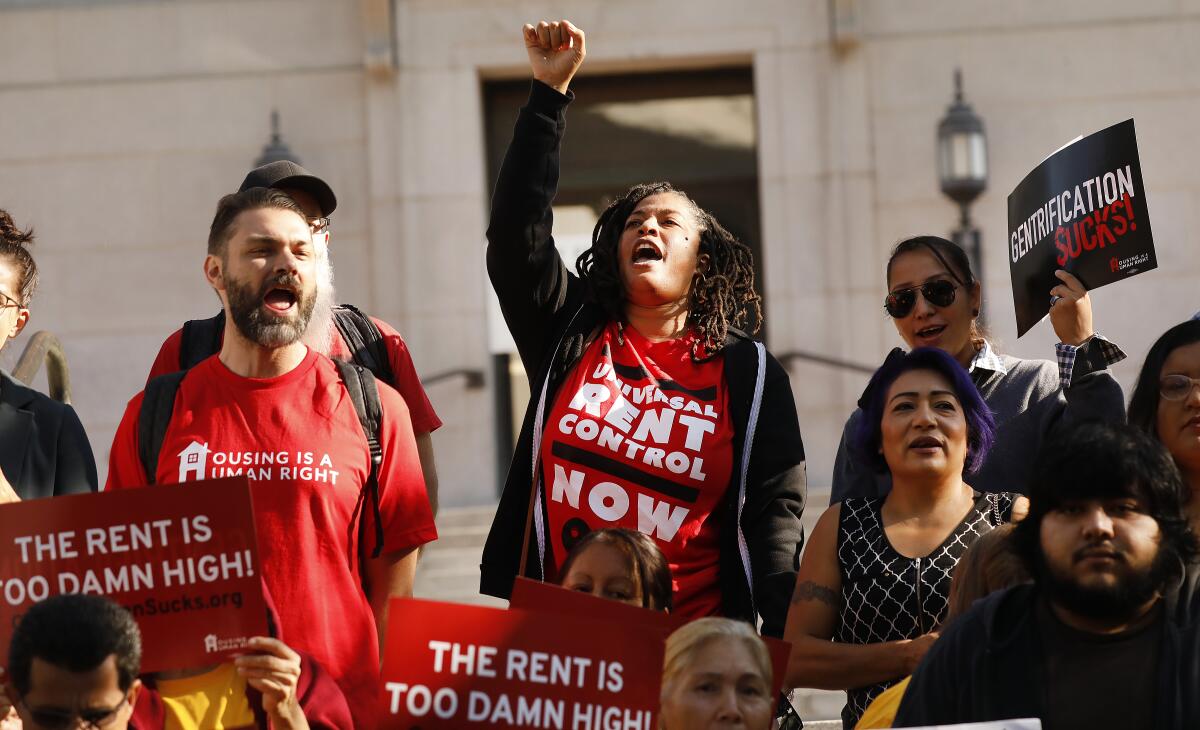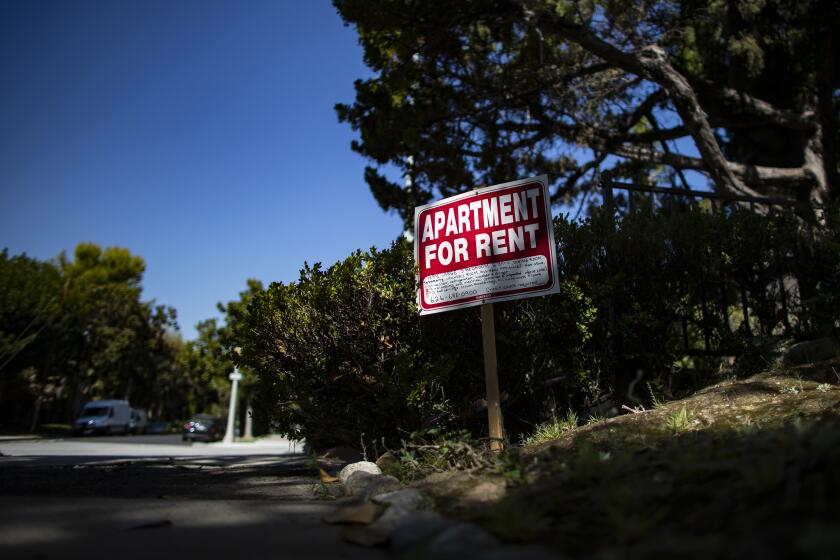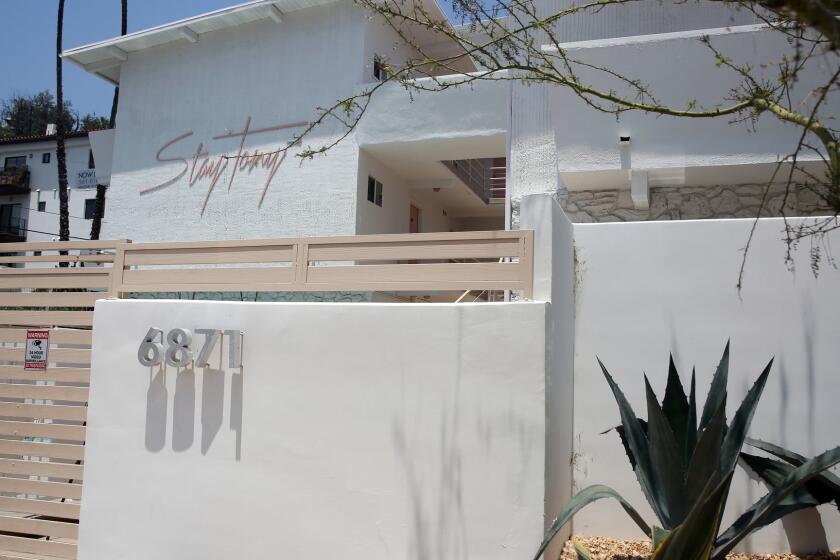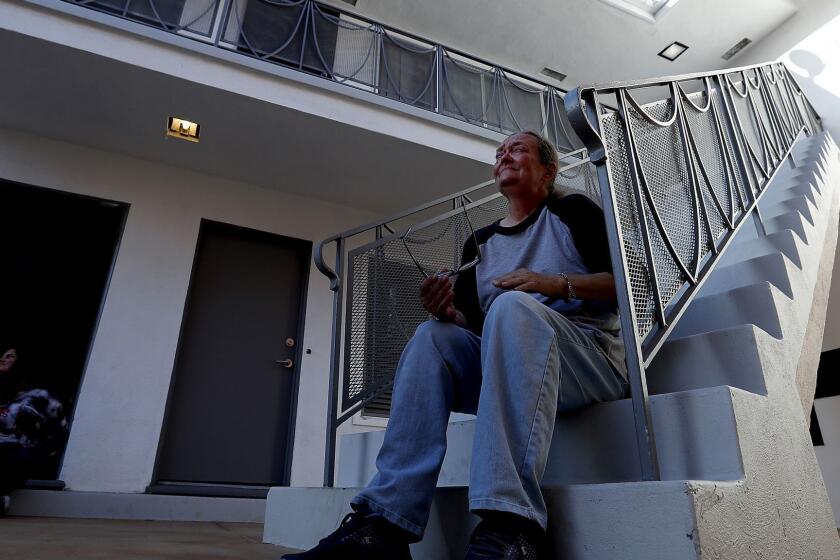Los Angeles City Council moves forward with eviction, rent increase moratoriums

- Share via
The Los Angeles City Council took a stopgap step Tuesday to stop no-fault evictions and rent increases, following fears that landlords are hiking rent and removing tenants before new state rental rules take effect in January.
In a 13 to 0 vote, the council instructed the city attorney to draft an emergency ordinance that would stop landlords from evicting tenants without sufficient cause, such as failure to pay rent.
The council also voted unanimously to draft an ordinance that would limit rent increases for the rest of the year and block evictions for failure to pay rent if recent increases were above the coming state cap.
The ordinances must still come before the council for a final vote and, given state restrictions, the city would surely face legal pushback if it tried to cap rents on currently uncontrolled units.
The council is in recess until Oct. 22. But Councilman Mitch O’Farrell told members that if the city attorney can draft the measures fast enough, he’d be willing to come back and vote this week, rather than next.
“Hundreds and hundreds of families are getting evicted,” said O’Farrell, who put forth the no-fault eviction moratorium. “That is going to continue unless we act really fast.”
“It is our obligation ... to ensure that families don’t end up on the street,” said Councilwoman Nury Martinez, who authored the rent increase moratorium.
Gov. Gavin Newsom has pledged to sign a statewide rent control bill for buildings older than 15 years. Studies from Los Angeles and San Francisco give insight into how landlords could respond.
Today, landlords of noncontrolled buildings can raise a tenant’s rent as much as they want when a lease ends. They can generally tell long-term residents to leave in 60 days for no stated reason, as long as doing so wouldn’t break the lease.
Daniel Yukelson, executive director of the Apartment Assn. of Greater Los Angeles, said he doesn’t believe many landlords are actually handing out 60-day notices now to beat the new regulations. He called the moratorium “a knee-jerk reaction to a whole lot of conjecture that was overly publicized.”
Last week, in an effort to reduce displacement and homelessness, Gov. Gavin Newsom signed Assembly Bill 1482 into law. Starting Jan. 1, annual rent increases for tenants in buildings older than 15 years will be capped at 5% plus inflation. Landlords covered by the law will also need just cause to remove renters who have lived in their units at least a year.
The law contains a provision that will cancel, as of Jan. 1, recent rent increase above the coming cap. But landlords aren’t required to return money already paid, and tenant groups are concerned a large rent increase would be tantamount to an eviction.
In addition, there isn’t a provision in the new state law that seeks to roll back evictions — something the bill’s author said wasn’t possible.
As a result, as long as the notice to vacate expires before Jan. 1, property owners can still remove low-paying tenants and significantly raise rents for good, because state law gives landlords the right to set rent when a unit is vacant.
The Los Angeles Times reported last week that a prominent landlord attorney, Dennis Block, has been advising property owners at local trade shows that they do just that and that tenant groups have reported a spike in 60-day notices.
Attorney Elena Popp, with the Eviction Defense Network, said tenants from more than 40 buildings came to her clinics last week seeking help with 60-day notices.
“It’s rather despicable what these landlords are doing,” said Trinidad Ruiz, an organizer with the L.A. Tenants Union. “The 60-day notices, once they are up, it will be during the holidays.”
Gerson Sanchez, a 32-year-old father of two, said his children fear they will end up homeless. Sanchez said his family was told last week to leave their $1,190 one-bedroom in Van Nuys in 60 days so the landlord could do renovations. They have to be out by early December, and Sanchez said he doesn’t have the funds to move.
“We don’t know where we are going to find a place within two months,” he said in a press conference before the vote.
Both O’Farrell and Martinez want their motions to be retroactive to Oct. 8, the date the governor signed the bill. However, the city attorney’s office told councilmembers it was unclear if that was possible.
Last week, an upstart company started providing furnished apartments for business travelers on Franklin Avenue in Hollywood.
Although Block spoke at the apartment owner association’s trade show, Yukelson said he doesn’t condone taking his advice.
“Ninety-nine point nine percent of the time, an owner’s relationship with his renters are excellent,” Yukelson said in an email. “Politicians just like to paint housing providers negatively to garner votes from renters that far outnumber owners.”
The association came out against the new state rules, in part arguing it would make it too difficult to prove wrongdoing in order to get rid of a bad tenant.
If the eviction moratorium rules end up being the same as under AB 1482, “it could be tolerable, but not ideal,” Yukelson said.
As of Jan. 1, property owners will still be able to evict tenants under the state rules for “substantial” renovations if they pay a relocation fee to those leaving equal to a month’s rent.
Life at The Driftwood apartments was far from perfect.
The city’s no-fault eviction moratorium would apply to buildings covered by the new state law and expire in January when the state rules take effect.
The motion seeking the moratorium did not lay out exactly what would be a just eviction, but the definition usually includes non-payment of rent or damage to a unit.
The new state law does not override Los Angeles’ existing rent control rules, which apply to buildings built on or before Oct. 1, 1978. Tenants in those buildings have greater protection against evictions and rent increases than the new state law.
An effort to limit rent increases in currently noncontrolled buildings would surely face legal hurdles. The Costa-Hawkins Act, for example, bars municipalities from limiting rent increases on buildings built after a given date.
Asked if Councilwoman Martinez wanted to stop any rent increase between now and January, or simply rent increases above the coming state cap, spokesman Rick Coca said the “answer depends on what we are allowed to do.”
“The motion asks the question and we’ll see what the answers are,” he said in a text, later adding that the city attorney will also weigh in on restrictions from Costa-Hawkins.
Yukelson said any caps the city placed on buildings built after Oct. 1, 1978, would violate state law.
More to Read
Inside the business of entertainment
The Wide Shot brings you news, analysis and insights on everything from streaming wars to production — and what it all means for the future.
You may occasionally receive promotional content from the Los Angeles Times.














